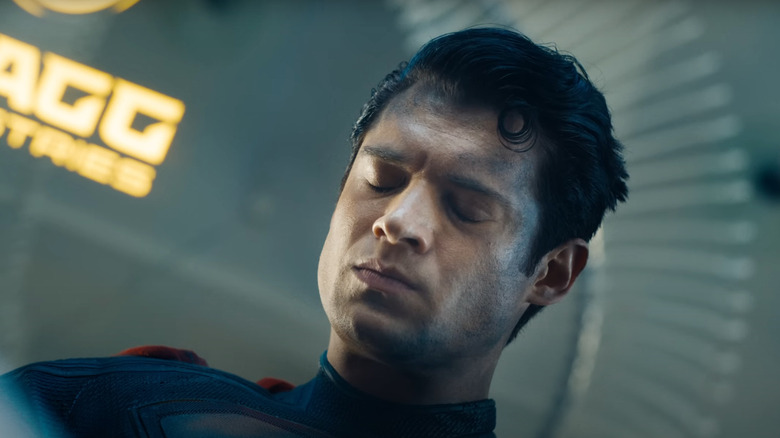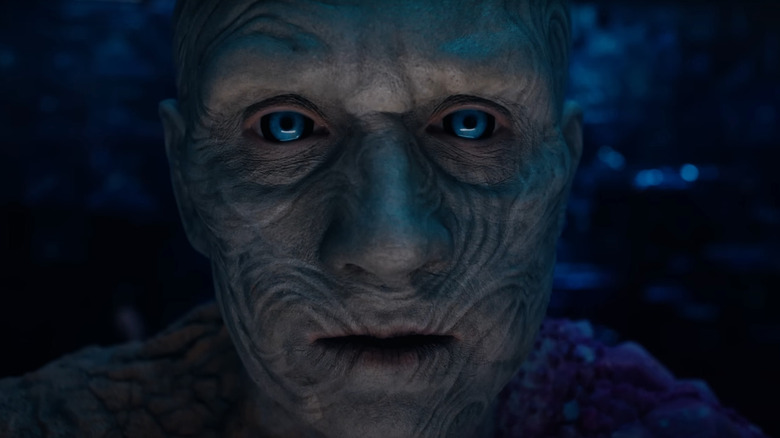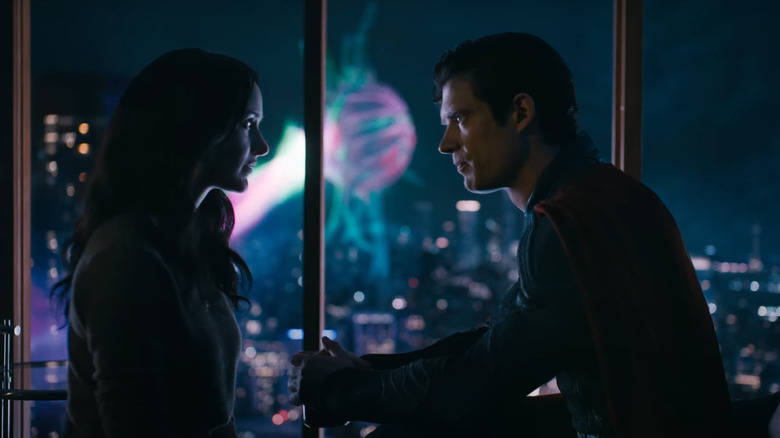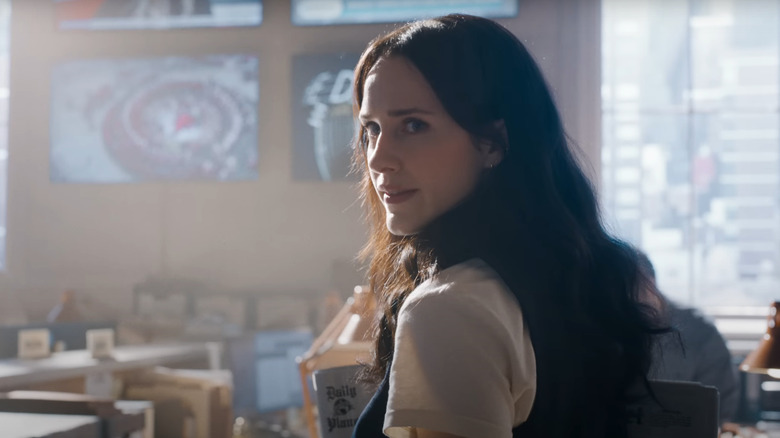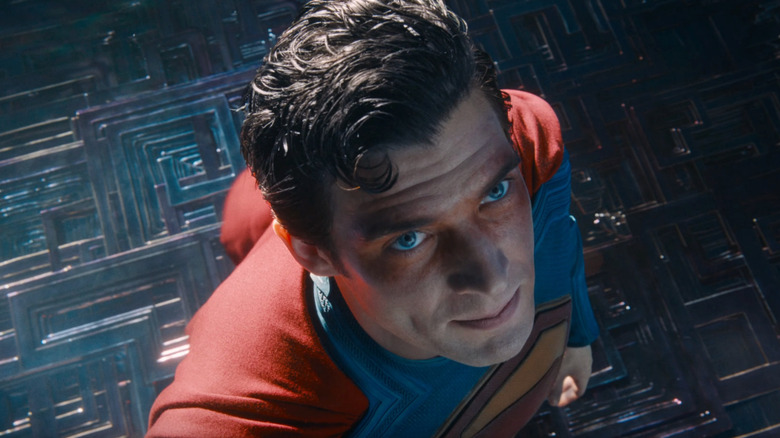James Gunn Explains The Balance Of Sadness And Hope In His Superman Movie [Exclusive Interview]
Superhero films have been a major cornerstone of blockbuster cinema for decades now. In fact, it's been nearly a half-century since Richard Donner's "Superman" proved that heroes in tights needn't be laughed at but could be inspiring instead, and the way that our culture has viewed such characters has only continued to evolve. These movies have been experiencing a fallow period lately, slumping creatively if not financially (though the latter is happening more often). There are many specific and extenuating reasons for this, yet there have also been several major developments since the release of "Avengers: Endgame" in 2019. We may not be experiencing superhero fatigue as much as we need to redefine what these characters mean to us, and how filmmakers might approach them in a way that feels current and personal instead of in a cookie cutter fashion.
James Gunn's "Superman" feels like a major step forward in that direction, as it's one of the most vibrant, inventive, and unique superhero films made in the past five years. It's a film that could've easily collapsed under its own perceived weight, as the movie not only seeks to re-introduce Superman (David Corenswet), Lois Lane (Rachel Brosnahan), and Lex Luthor (Nicholas Hoult) to an audience generally familiar with those characters, but also officially kick off the new DC Universe, with Gunn and his DC Studios co-CEO Peter Safran seeking to establish an interconnected tapestry of characters without stumbling in the same ways that the DC Extended Universe did. On top of this lies the question of what this movie's Superman is like, what he and the film stand for, and whether or not audiences will respond favorably to that. How Gunn deftly threads all these needles in "Superman" is nothing short of remarkable; it's the first movie since perhaps the initial "The Avengers" that feels like it rewards longtime fans and newcomers equally, in that it tells a story that feels utterly personal and distinct yet contains numerous possibilities for the future.
I had the pleasure of speaking with Gunn on the eve of the release of "Superman," and the writer-director was just as refreshingly passionate and honest as the movie he's just made. We discussed the responsibility of portraying these classic characters, the film's kinetic camerawork, the theme of journalism and its importance to both the movie and the real world, and how Superman (the film and the character) is a potent mixture of sadness and hope.
Note: This interview has been lightly edited for clarity and brevity.
Finding new facets to Superman and building an ensemble of favorite characters
This movie has such a wonderful message of staying true to yourself and being your own person. I love seeing that because it really feels like I saw you in it, and what you want to say about these characters and what they mean to you. What was that process like for you, getting that into this movie? Did it feel freeing, in terms of being the boss so you can put whatever you want in there? Or was it like, "I still feel the responsibility to the character, to the legacy," that sort of thing?
Definitely, I still felt the responsibility of the characters. And the truth is, is that I've made a lot of movies now, really since "Guardians [of the Galaxy] 1," where I was able to do whatever I wanted. I've never had a problem with doing what I wanted in any of the "Guardians" movies or "The Suicide Squad" or whatever. So that hasn't really been an issue.
I think it was a matter of really being true to Superman, finding an aspect of Superman that maybe we haven't seen before, so focusing on him as a person a little bit more. At the end of the day, this is a movie about all the pyrotechnics and action and all that, but at the center of it, it's really a story about Superman finding out something about himself, not knowing how to deal with it, and then finding a way through that emotional distress. And that's something that I don't feel like has been in a movie before, or a TV show. I think that was what was exciting to me.
Your movies are known for having great ensembles and being team movies, so to speak. While this isn't technically a team movie, watching the film, I felt this is still an ensemble because Superman's on everyone's team. What was it like giving everybody a moment to shine in this movie while still keeping Superman, Lois, and Lex the focus?
Well, that's just because I love those characters. I love Guy Gardner. I love Mr. Terrific. I love Lois Lane. I love Cat Grant. I love these characters from the comics, and so giving them each a little bit of a moment, [like with] Metamorpho, and looking at them in a different way maybe than they've normally been [seen]. Guy is very true to the comics. Mr. Terrific is pretty true to the comics. Metamorpho is a little more haunted. Really, it was fun because I'm simply a fan of those characters in the comics.
The influences of camera tech and Korean action cinema on Superman
I would love to hear about your approach to the film's visual aesthetic, because watching it, I really noticed that you and cinematographer Henry Braham untethered the camera so much, but it never felt wild. It felt very precise. What was the process like in considering this approach?
Well, it's just been kind of the thing that Henry and I have been developing together over the past few movies. I think you can see the shift that happens from "Guardians 1" to "Guardians [Vol.] 2" and then "The Suicide Squad." That's the modern era of [our] filmmaking.
A couple of things have influenced that. Number one, the Stabileye, which became kind of famous in "1917," we used that first in "Guardians 2." That was the first time that was ever used. After that, we've created these smaller versions called Nanos and Picos, which are a small version of the Stabileye. So you're able to move and become very intimate and move around. We can move all the cameras around in a way that gives you a little bit of a handheld feeling, but without giving you the sick feeling that you might get on the big screen with a handheld camera. We've been developing that.
And then the other one I have to say is, I'm a huge fan of Asian action movies, especially Hong Kong action movies from when I was younger, and then in recent years, Korean action movies. There's a guy named Director J [Jung Byung-gil] who directed "The Villainess," who I have to give a shout-out [to], because he reinvented action. I just stole everything from Director J, which he'll be very happy to hear me saying that. He's a great guy, and so I think that our action, especially starting with "The Suicide Squad," was influenced by "Villainess" and Director J's work in general.
Lois Lane and the other Daily Planet employees actually get to be journalists in the film
One of the aspects of the movie that I am drawn to the most is the way that you guys approach The Daily Planet, and the way you treat journalism and journalists. That scene between Lois and Clark in the apartment, it's just one of the coolest scenes in a comic book movie I've ever seen. What did you want to say about journalism in this movie?
I just think that journalism is incredibly important. People think of me as being [supportive of] animals, and I really do like to help foster dogs and support any organization that helps animals. But I also like to support any organization that supports journalists. I think that they're such an important thing in this world.
All the journalists I know are so dedicated to their craft, and I wanted to show Lois Lane not just being a journalist, like she's cosplaying a journalist, but actually being a journalist. I wanted to see them in a flying saucer, doing their thing and posting the thing! They're trying to get that done. I wanted to see Jimmy, who was so hungry to be that, and Perry, who's the sort of old expert in everything. I wanted to see real journalism in Lois, in the same way you see the real human in Superman.
Finding the sadness and hope within Superman
I asked a version of this question of George Miller when we spoke about hope in "Furiosa" last year. This movie gives me a lot of hope for humanity in terms of just giving us a bellwether in Superman of something to follow. What do you want people to take away from this movie in addition to that, or is that the main thing?
That's the main thing. You just gave it to me, so thank you for that. That means something to me. We had a cast dinner the night before we started, at Enzo's in Atlanta. I talked about just goodness, being a good human being, and the value of that and the value of spotlighting that in this movie — that at the end of the day, everybody cares about being edgy, or being cool, or being mean-spirited, or being funny, and none of those things matter. What matters is just that we love each other. If that comes off in the movie a little bit, and if somebody feels that a little bit, then that works. That works for me.
But I think that there's a sadness to Superman because we want Superman. [laughs] We want somebody who's really good, who's powerful, and I don't think that's really what we're seeing a lot of in this world. But hopefully, some kid's going to go see it, and they will be that powerful person that's also good in five years, 10 years, 20 years.
"Superman" is in theaters now.
